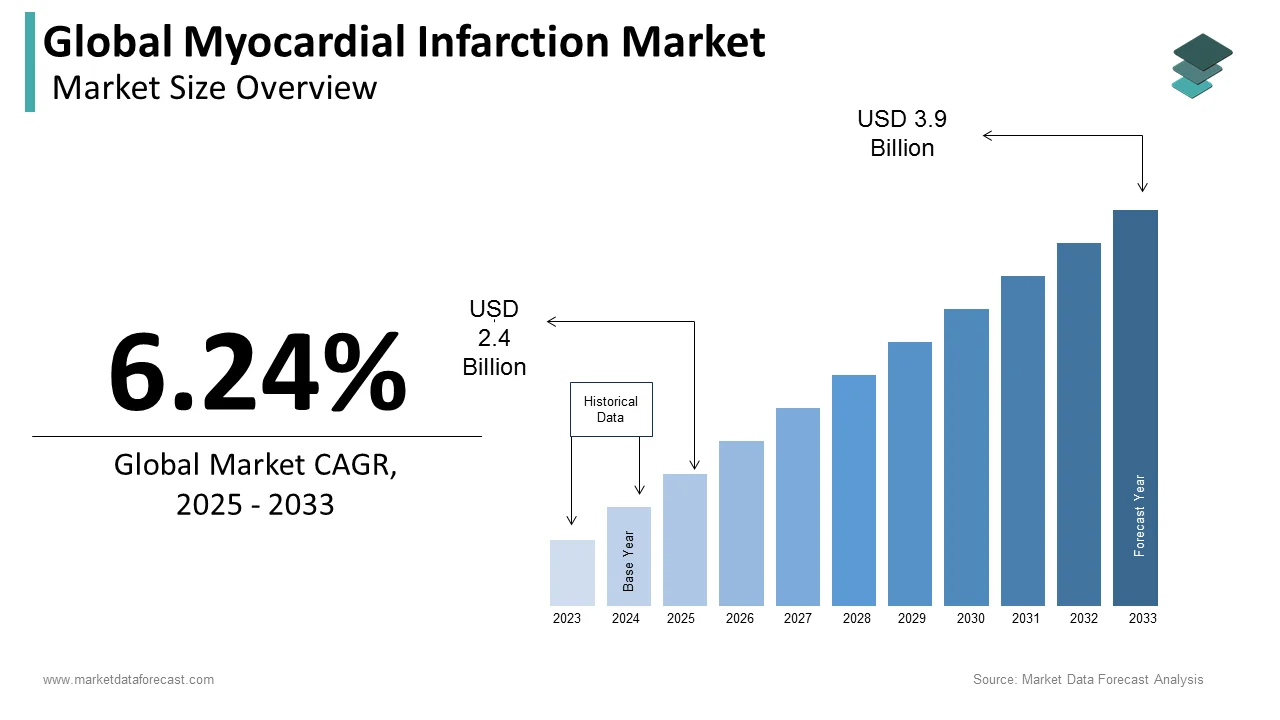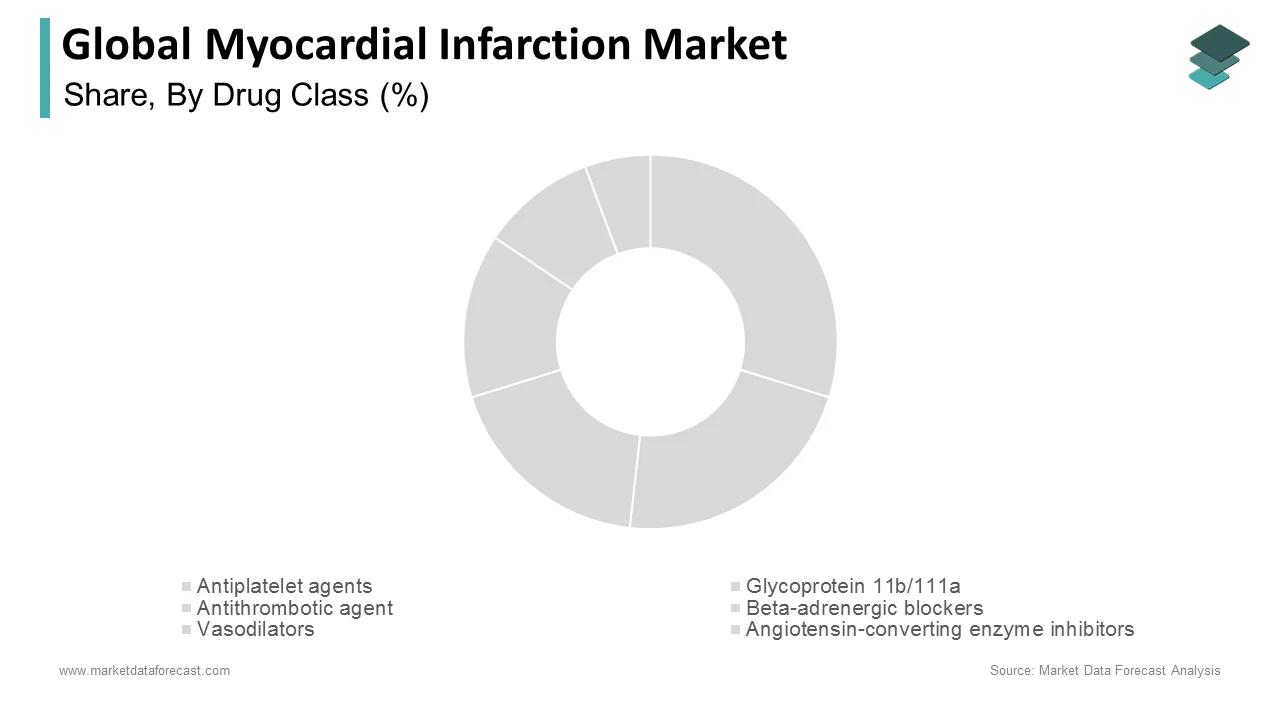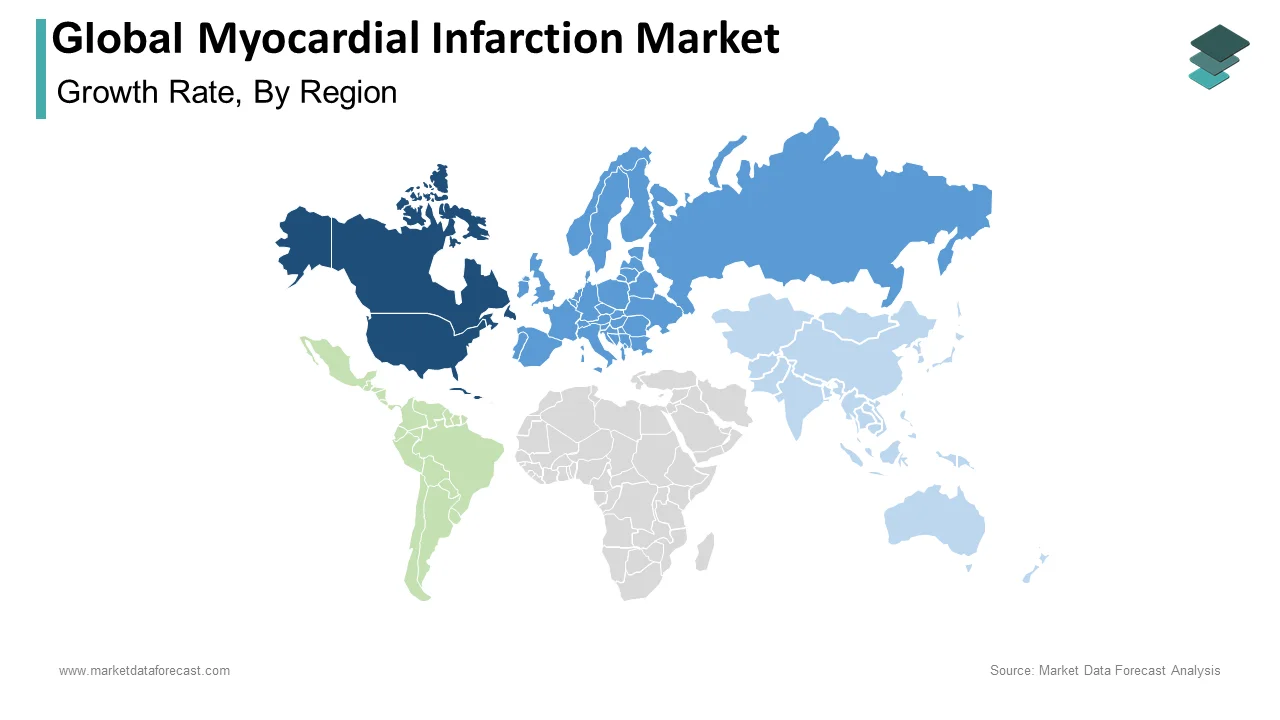Global Myocardial Infarction Market Size, Share, Trends & Growth Forecast Report By Drug Class, Method of Administration, Distribution Channel and Region (North America, Europe, Asia-Pacific, Latin America, Middle East and Africa), Industry Analysis From 2025 To 2033.
Global Myocardial Infarction Market Size
The size of the global myocardial infarction market was worth USD 2.25 billion in 2024. The global market is anticipated to grow at a CAGR of 6.24% from 2025 to 2033 and be worth USD 3.9 billion by 2033 from USD 2.4 billion in 2025.

A myocardial infarction is also known as a heart attack in common terms. This is an extremely dangerous condition of heart disease. The reason behind the occurrence of myocardial infarction is mainly the lack of blood flow to the cardiac muscles. The lack of blood flow to the cardiac muscles can be hindered by many factors but is mainly due to the blockage in one or more heart arteries. The lack of blood flow leads to affect the heart muscles. This leads to necrosis of heart muscles. If the blood flow to the heart muscle isn’t enough provided then it may lead to cause heart attack. The symptoms of myocardial infarction involve chest pain, shortness of breath, fatigue, heart palpitation, feeling lightheaded, passing out, etc. The major reason behind heart attack is a blockage in arteries providing blood to heart muscles.
The artery blockage is due to the formation of plaques, a sticky substance that builds up inside arteries. Myocardial infarction without a block in an artery is very rare, around only 5%. This type of myocardial infarction is due to coronary artery spasms, electrolyte imbalance, etc. Myocardial infarction is diagnosed by the use of an electrocardiogram, echocardiogram, blood test, heart-captured tomographic scan, Heart MRI, etc. Myocardial infarction can be treated by supplementary oxygen, medications such as anti-clotting medications, nitro-glycerine, and thrombolytic medications. Blood circulation can be restored by percutaneous coronary intervention. The percutaneous coronary intervention involves the use of the catheter-based device which is inserted into a major blood vessel.
MARKET DRIVERS
The increase in the prevalence of cardiovascular diseases globally is the main driving factor in the market.
The increase in the prevalence of these diseases leads to an increase in demand for drugs related to treatment for myocardial infarction. Myocardial infarction is one of the main causes of death across the globe. Hence to avoid the consequences of the disease, the demand for the market is increasing. For instance, according to the National Library of Medicine, Acute myocardial infarctions prevalence is increasing approaching 3 million people worldwide, with more than 1 million deaths in the United States annually.
The increase in research and development in the healthcare industry drives market growth.
The rise in clinical trials in the medical field leads to the development of new modern drugs. For instance, The Bristol Myers Squibb-Janssen Collaboration Launches Pivotal Phase 3 Librexia Clinical Trial Program Evaluating Milvexian, an Investigational Oral Factor XIa Inhibitor. The increased mergers and acquisitions in the key players boost the market growth. For instance, in Nov 2024, Johnson & Johnson Acquire Cardiovascular Technology Company Abiomed in USD 16.6 Billion Deal.The increase in the geriatric population drives the myocardial infarction market growth. As elderly people are more susceptible to chronic diseases, this led to an increase in demand for myocardial infarction market. In addition, the increase in smokers, alcoholism, and sedentary lifestyles results in less physical activity which leads to an increase in demand for myocardial infarction market. According to the Centers for Disease Control and Prevention, in 2024, 11.5% of U.S. adults (an estimated 28.3 million people) currently smoked cigarettes, 13.1% of men, and 10.1% of women. The increased initiatives regarding cardiovascular diseases by different government authorities.
MARKET RESTRAINTS
The major restraining factor for the myocardial infarction market is the stringent regulations by authorities to ensure the quality of medications. In addition, the cost associated with the treatment and diagnosis of myocardial infarction is very high. The people in the lower- or middle-income category cannot afford the rate associated with this. This hampers the market growth. The side effects associated with the treatment of myocardial infarction such as ventricular free wall rupture, lead to a decrease in the growth of the myocardial infarction market.
REPORT COVERAGE
|
REPORT METRIC |
DETAILS |
|
Market Size Available |
2024 to 2033 |
|
Base Year |
2024 |
|
Forecast Period |
2025 to 2033 |
|
CAGR |
6.24% |
|
Segments Covered |
By Drug Class, Route of Administration, Distribution Channel, and Region. |
|
Various Analyses Covered |
Global, Regional, and country-level analysis; Segment-Level Analysis, DROC; PESTLE Analysis; Porter’s Five Forces Analysis, Competitive Landscape; Analyst Overview of Investment Opportunities |
|
Regions Covered |
North America, Europe, APAC, Latin America, Middle East & Africa |
|
Market Leaders Profiled |
Bristol Myers Squibb Co., Bayer AG, Johnson and Johnson, Sanofi S.A., Novartis International AG, AstraZeneca plc., Daiichi Sankyo co. ltd., Boehringer Ingelheim International GmbH, Pfizer, Merck KgaA., and Others. |
SEGMENTAL ANALYSIS
By Drug Class Insights

Among these, Antiplatelet drugs dominate the market. The antiplatelet drug segment is anticipated to show its dominance in the market over the forecasting period. This is due to there being very rare incidences of side effects such as adverse ischemic incidences. The analgesics segment is expected to show the fastest CAGR growth rate during the forecasting period. These are painkillers that treat pain associated with myocardial infarction.
By Route of Administration Insights
Among these, the oral route segment dominates the market. The oral route of administration segment is expected to dominate the market over the forecasting period. This is due to aspirin-like tablets can be taken orally which has its benefits and is also a cost-effective treatment when compared to parenteral treatment. The parenteral segment is expected to show the fastest CAGR growth rate over the forecasting period.
By Distribution channel Insights
Among these, the Online pharmacy segment is expected to show its dominance over the forecasting period. This is due to an increase in the adoption of e-commerce, and an increase in the use of cell phones. In addition, the online pharmacy increases patient convenience through fast delivery and by giving them discounts on the products.
REGIONAL ANALYSIS
Regionally, North America dominates the myocardial infarction market in 2024.
The North American region is anticipated to show its dominance over the forecasting period. This is due to the increase in the prevalence of cardiovascular disease in the region. In addition, the increase in the geriatric population drives market growth. As the elderly people are more susceptible to these diseases. Hence increases the demand for the myocardial infarction market. For instance, according to the National Library of Science, in 2024, The global prevalence of MI in individuals < 60 years was found 3.8%. Also, following the assessment of 20 eligible investigations with a sample size of 5,071,185 individuals (> 60 years), this value was detected at 9.5%.
The European area had the second-biggest regional market in the world in 2024, and it is predicted that it will hold the highest share of the worldwide market during the projection period due to an increase in the number of products that European regulatory bodies have approved for use in treating cardiac ailments. The EU government is, however, taking many steps to improve the healthcare system and support programs aimed at lowering the incidence of cardiovascular diseases.
Asia Pacific region is expected to grow at the fastest CAGR over the forecasting period. Increased CVD and heart attack cases, better healthcare infrastructure, and a rise in unhealthful lifestyles among the local population are some of the important reasons driving the market's expansion. A further factor in the growth of the myocardial infarction marker in Asia Pacific is the expanding use of medical tourism. Due to the availability of high-quality care at significantly reduced costs, people from all over the world travel to Asia-Pacific nations, boosting the region's market and economy.
The LAMEA myocardial infarction market is anticipated to grow at a consistent CAGR over the forecast period. The market is growing rapidly as a result of the increase in cardiovascular disease and high blood pressure. The rising incidence of hypertension in the area raises the risk of having a heart attack. It is projected that the rise in hypertension among South African and UAE patients will hasten the adoption of myocardial infarction diagnosis and treatment procedures, decreasing the likelihood of serious illnesses like heart attacks.
KEY MARKET PLAYERS
Some market players in the Myocardial Infarction Market are Bristol Myers Squibb Co., Bayer AG, Johnson and Johnson, Sanofi S.A., Novartis International AG, AstraZeneca plc., Daiichi Sankyo co. ltd., Boehringer Ingelheim International GmbH, Pfizer, Merck KgaA.
RECENT MARKET DEVELOPMENTS
-
In Nov 2022, Johnson & Johnson (New Brunswick, N.J., USA) entered into a definitive agreement to acquire all outstanding shares of Abiomed, Inc.
-
U.S. FDA Approves First Anti-Inflammatory Drug for Cardiovascular Disease. LODOCO® (colchicine, 0.5 mg tablet) Reduces Cardiac Event Risk in Adult Patients with Established Atherosclerotic Cardiovascular Disease (ASCVD) by an Additional 31% on Top of the Standard of Care.
MARKET SEGMENTATION
This research report on the myocardial infarction market has been segmented and sub-segmented based on the drug class, route of administration, distribution channel, and region.
By Drug Class
- Antiplatelet drug
- Glycoprotein 11b/111a
- Antithrombotic agent
- Beta-adrenergic blockers
- Vasodilators
- Angiotensin-converting enzyme inhibitors
- Angiotensin receptor blocker
- Analgesics
- Thrombolytics
By Route of Administration
- Oral
- Parenteral
By Distribution channel
- Retail Pharmacy
- Hospital Pharmacy
- Online Pharmacy
By Region
- North America
- Europe
- Asia-Pacific
- Latin America
- Middle East & Africa (MEA)
Frequently Asked Questions
Which region had the major share in the global myocardial infarction market in 2024?
North America accounted for the dominating share of the global myocardial infarction market in 2024.
Which are the major players in the myocardial infarction market?
Companies playing a key role in the global myocardial infarction market are Bristol-Myers Squibb Co., Johnson & Johnson Services Inc., Bayer AG, Sanofi S.A., Novartis International AG, AstraZeneca plc., Boehringer Ingelheim International GmbH, Daiichi Sankyo Co Ltd., Pfizer Inc., and Merck KGaA.
What is the growth rate of the myocardial infarction market?
Between 2025 and 2033, the global myocardial infarction market is expected to grow at a CAGR of 6.24%.
How big is the myocardial infarction market?
The global myocardial infarction market size was worth USD 2.25 billion in 2024.
Related Reports
Access the study in MULTIPLE FORMATS
Purchase options starting from $ 2500
Didn’t find what you’re looking for?
TALK TO OUR ANALYST TEAM
Need something within your budget?
NO WORRIES! WE GOT YOU COVERED!
Call us on: +1 888 702 9696 (U.S Toll Free)
Write to us: [email protected]

